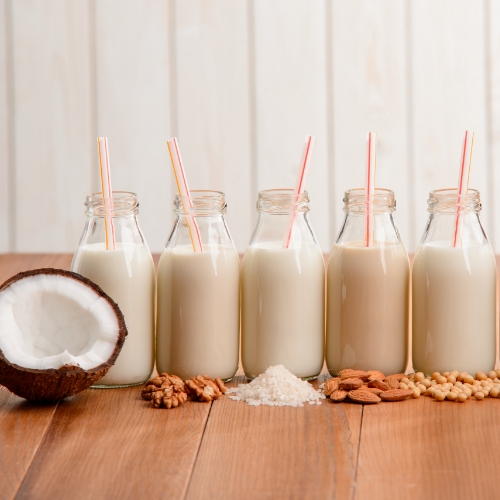- Ideas for Cooking With Dietary Restrictions
- Tasty Gluten And Lactose-Free Desserts
- Gluten And Lactose-Free Breakfasts to Brighten Up Your Morning
- Allergy Management for a Carefree Return to School
- Snacks Free of Priority Allergens
- Halloween for everyone!
- An allergy-free Easter celebration
- Milk allergy and plant-based beverages
Milk allergy and plant-based beverages

An allergy to milk occurs when a person’s immune system reacts to the protein in cow’s milk and other dairy products such as yogurt, cream, butter, and cheese. An IgE-mediated milk allergy can even cause anaphylaxis which is “a rapid, generalized and often unpredictable allergic reaction. Without an injection of epinephrine, anaphylaxis can cause death in a matter of minutes.” Even though an allergy to cow’s milk can persist through adulthood, most children will no longer be allergic to milk once they reach the age of 3 or 4. It’s important to be aware of the difference between lactose intolerance and a milk allergy. Someone who is lactose intolerant will have a hard time digesting the sugar (lactose) in the milk. In fact, lactose-free milk should not be consumed by anyone with a milk allergy because it still contains the proteins found in cow’s milk. Lactose intolerance is very rare in children under the age of 3. It is generally very easy to find out if a product purchased at a grocery store contains milk. That’s because milk is one of the 9 priority allergens that must be listed by manufacturers on their product’s label or packaging. Furthermore, the name of the allergen must be clearly stated. In other words, any product that contains cow’s milk must have the word “milk” in its list of ingredients OR “Contains” statement. Moreover, products that bear the mention “may contain milk” must also be avoided by those with an allergy to cow’s milk because the product might have been contaminated by the allergen. Keep in mind that the “May contain” statement is not mandatory by law.

Possible substitutions
Evaporated milk or sweetened condensed milk: Boil 750 mL (3 cups) of a plant-based beverage and let it evaporate until only 250 mL (1 cup) is left. For a sweetened version, add 310 mL (1 ¼ cup) of granulated sugar after evaporation and heat until the sugar has dissolved.Buttermilk: Combine 250 mL (1 cup) of a plant-based beverage with 15 mL (1 tablespoon) of white vinegarButter: Vegetable oil, dairy-free margarine, coconut oil Cream: Coconut cream, creamy soy preparation, silken tofuCheese: nutritional yeast (imparts the flavour of cheese)Ice cream: pureed frozen bananas Many grocery stores now offer plant-based alternatives to cheese, cream, and yogurt.
Replacing cow’s milk with another option
Plant-based beverages have multiplied on store shelves in the past few years. They are enjoyed by people allergic to cow’s milk protein, vegans, and anyone who prefers their taste to regular milk. Wondering which option to pick? These nutritional recommendations could help you in your choice:Children under the age of 2: Maternal milk, soy baby formula, or a baby formula designed to treat cow’s milk protein allergy
Children (2 years and over): Enriched soy beverage (not the low-fat option) or another fortified plant-based beverage*
Teens and adults: Various fortified beverages, soy (preferred for its protein content), rice, peas, coconut, oat, hemp, almond, etc. *Plant-based beverages (rice, peas, hemp, etc.) can be introduced into a person’s diet starting at the age of 2. However, from a nutritional standpoint, a regular soy beverage is the most similar in nature to 2% cow’s milk in terms of protein and fat. If you choose any other plant-based beverage for a growing child, you might need to add more high-quality fats in their meals and make sure they get enough protein. If you need more guidance, you can contact a dietitian-nutritionist who is a member of the Ordre des diététistes nutritionnistes du Québec.

Milk-free recipes
Even though dairy products are extremely common, there are myriad resources and recipes that will enable you to enjoy a satisfying and varied milk-free diet. Here are a few delicious recipes you can try:

















